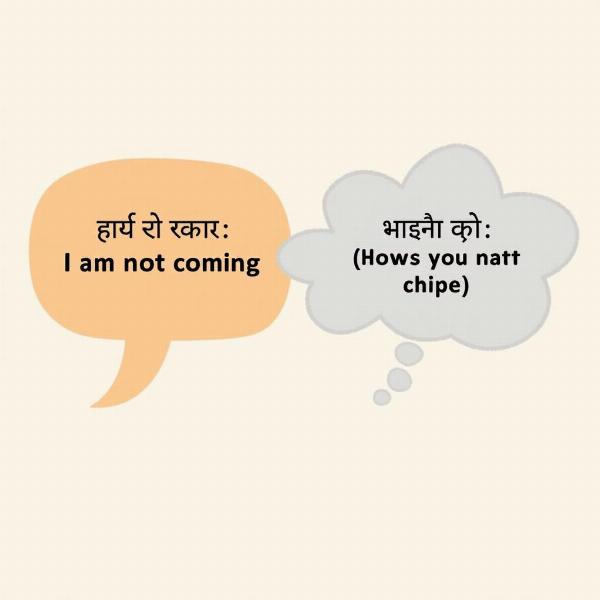Understanding the nuances of “I am not coming” in Hindi can be tricky, as a direct translation doesn’t always capture the cultural context or intended meaning. This guide explores various ways to express this sentiment in Hindi, considering politeness levels, formality, and specific situations. We’ll delve into the most common translations, their subtle differences, and how to choose the right phrase for effective communication.
Different Ways to Say “I Am Not Coming” in Hindi
Several Hindi phrases convey the meaning of “I am not coming,” each with its own connotations. Choosing the appropriate phrase depends on the context and your relationship with the person you’re addressing.
Formal Expressions
-
Main nahin aa raha/rahi hoon (मैं नहीं आ रहा/रही हूँ): This is a standard and relatively formal way to say “I am not coming.” The verb ending changes based on the speaker’s gender (raha for masculine, rahi for feminine). It’s suitable for professional settings or when speaking to elders.
-
Mai aane mein asamarth hoon (मैं आने में असमर्थ हूँ): This translates to “I am unable to come.” It’s more formal and polite than the previous option, often implying a genuine inability due to prior commitments or circumstances.
Informal Expressions
-
Main nahin aa sakta/sakti (मैं नहीं आ सकता/सकती): This translates to “I cannot come.” It’s slightly less formal and suitable for conversations with friends or family. The verb ending, again, changes based on gender (sakta for masculine, sakti for feminine).
-
Main nahin aa raha/rahi (मैं नहीं आ रहा/रही): This is a more casual and shorter version of the formal equivalent. It’s commonly used in informal conversations.
-
Nahin aa raha/rahi (नहीं आ रहा/रही): This is the shortest and most informal version, often used among close friends. It can be considered abrupt in more formal settings.
 Formal vs. Informal Hindi Phrases for "I Am Not Coming"
Formal vs. Informal Hindi Phrases for "I Am Not Coming"
Choosing the Right Phrase: Politeness and Context
When declining an invitation or informing someone of your absence, politeness plays a crucial role. Using overly casual language in formal settings can be perceived as disrespectful. Conversely, using excessively formal language with close friends can seem distant.
Examples
-
Formal: If you’re declining a business meeting, “Mai aane mein asamarth hoon” is the most appropriate choice.
-
Informal: If you’re telling a friend you can’t make it to a casual gathering, “Main nahin aa sakta/sakti” or even “Nahin aa raha/rahi” would suffice.
Cultural Nuances and Considerations
Indian culture places a high value on respect and politeness, especially towards elders and authority figures. When declining an invitation, offering a brief explanation or apology is often appreciated. This demonstrates consideration and helps avoid any misunderstanding.
Example
Instead of simply saying “Main nahin aa raha,” you could say, “Maaf kijiye, main nahin aa raha kyunki mujhe kuch kaam hai” (माफ़ कीजिए, मैं नहीं आ रहा क्योंकि मुझे कुछ काम है), which means, “I’m sorry, I am not coming because I have some work.”
Beyond the Basics: Expressing Specific Reasons
While the phrases discussed above cover general situations, sometimes you need to be more specific. For instance, if you’re not coming due to illness, you could say, “Main tabiyat kharab hone ke karan nahin aa raha/rahi hoon” (मैं तबियत खराब होने के कारण नहीं आ रहा/रही हूँ), meaning “I am not coming because I am unwell.”
Conclusion: Mastering “I Am Not Coming” in Hindi
Expressing “I am not coming” effectively in Hindi requires understanding the nuances of various phrases and their appropriate usage in different contexts. By considering the level of formality, your relationship with the person you’re speaking to, and the specific reason for your absence, you can communicate clearly and respectfully in any situation. Remember to prioritize politeness and cultural sensitivity, especially when declining invitations or informing someone of your inability to attend. Mastering these nuances will enhance your communication skills and strengthen your interpersonal relationships in Hindi-speaking environments.
FAQ
- What is the most formal way to say “I am not coming” in Hindi? Mai aane mein asamarth hoon (मैं आने में असमर्थ हूँ) is the most formal way.
- Can I use “Nahin aa raha/rahi” with elders? It’s best to avoid this overly casual phrase with elders. Opt for a more formal option.
- How can I politely decline an invitation in Hindi? Offer a brief explanation or apology along with the phrase for “I am not coming.”
- What should I say if I am not coming due to illness? You can say, “Main tabiyat kharab hone ke karan nahin aa raha/rahi hoon.”
- Is it important to consider gender when using these phrases? Yes, some verb endings change based on the speaker’s gender.
- How can I learn more about Hindi phrases? Resources like Meaning-Hindi.in offer comprehensive guides and translations.
- What if I need help with Hindi translations for business documents? Meaning-Hindi.in provides professional translation services for various needs.
Meaning-Hindi.in: Your Trusted Partner for Hindi Translations
Meaning-Hindi.in offers professional translation services specializing in various domains, including business and commerce, legal, technical, website localization, educational, and specialized fields. We prioritize accuracy, cultural sensitivity, and timely delivery. Whether you need to translate business documents, legal contracts, or educational materials, our expert team ensures your message is conveyed effectively in Hindi. Contact us today for all your Hindi translation needs at [email protected] or call us at +91 11-4502-7584. Meaning-Hindi.in is your trusted partner for bridging language barriers and connecting with the Hindi-speaking world.